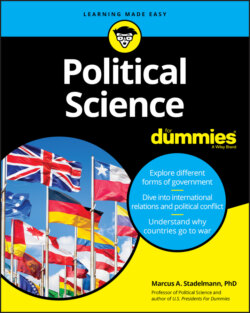Читать книгу Political Science For Dummies - Marcus A. Stadelmann - Страница 3
Political Science For Dummies® To view this book's Cheat Sheet, simply go to www.dummies.com and search for “Political Science For Dummies Cheat Sheet” in the Search box. Table of Contents
Оглавление1 Cover
2 Introduction About This Book Conventions Used in This Book Icons Used in This Book Beyond the Book Where to Go from Here
3 Part 1: Understanding Political Science Chapter 1: Discovering the Discipline of Political Science Looking at Politics and Political Science Studying Political Power Searching for Sources of Legitimacy Chapter 2: Shaping Research in Political Science: Looking at Major Approaches Starting with Traditionalism Switching to Behavioralism Moving Leftward with Post-Behavioralism Comparing Political Science Theories Looking at Historical Sociology Seeking Benefits: Rational Choice Theory Chapter 3: Dealing with Political Culture Analyzing Political Culture Sustaining Democracy: The Civic Culture Working on Political Socialization Moving from Materialist to Postmaterialist
4 Part 2: Comparing Governments Chapter 4: Discussing Different Forms of Government Identifying Types of Governments Dividing Powers Chapter 5: Setting the Rules: Constitutions Looking at Constitution Basics Creating a New Country: The U.S. Constitution of 1789 Checking on a New Document: The Russian Constitution Chapter 6: Comparing Political Institutions: Systems of Government Comparing Democratic Political Systems Studying the U.S. Congress Looking at Great Britain Analyzing Executives Going Bureaucratic Settling Disputes Chapter 7: Elections, Political Parties, and Interest Groups Studying Elections Political Parties — Necessary for Democracy Interest Groups: Influencing the Government
5 Part 3: Going Global: International Relations Chapter 8: Thinking Globally: The Study of International Relations Understanding the Origins of International Relations Getting into the Theories of International Relations Getting Real: The Power of Realism Doing Good: Idealism Being Equal through Global Humanism Striving for Change with Constructivism Chapter 9: Creating Some Order: International Law and Diplomacy Defining International Law Studying Sources of International Law Connecting with Diplomacy Chapter 10: Creating Order through International Organizations Getting Together in Europe — The Concert of Europe Calling for a League of Nations Needing a United Nations Chapter 11: Not Going to War: The Cold War 1946–1991 Explaining the Cold War Highlighting the Cold War Analyzing Strategic Doctrines and the Arms Race Chapter 12: Dealing with Political Violence: War and Terrorism Examining Warfare Looking at the Causes of War Dealing with Terrorism Going to War with Evil Exploring the Costs of War Chapter 13: Mixing Disciplines: International Political Economy Fusing Economics and Politics Creating a New Economic Order Discovering Economic Theories Examining Population and the Division of Wealth Causing Economic Decline in the Third World Seeking Globalization: An Integration of Countries
6 Part 4: Going from Classical to Modern Political Ideologies Chapter 14: Starting in Greece: The Roots of Political Science Studying Ancient Greece and the Start of Political Science Questioning Everything: Socrates Putting Political Philosophy into Play: Plato Seeking a Scientific Approach: Aristotle Putting Ethics to Use Chapter 15: Going Modern: Middle Ages to the Present Taking a Lesson on Catholic Theory Understanding Power Moving to Classical Conservatism Advocating for Classical Liberalism Putting the Government Back in Charge: Modern Liberalism Chapter 16: Moving to the Right: Fascism, Neofascism, and Right-Wing Populism Getting a Sense of Fascism Starting Out: The Beginnings of Fascism Rising of Neofascism Challenging the Elite: Populism Swinging Right: Right-Wing Populism in Europe Chapter 17: Going Left: Communism, Socialism, and Social Democracy Causing Socialism Starting with Karl Marx Updating Marxism: Lenin Traveling to Asia: Maoism Going Democratic: Social Democracy
7 Part 5: The Part of Tens Chapter 18: Ten Political Science Books Everyone Should Read Politics (335–323 BCE) The Prince (1513) Leviathan (1651) Two Treatises of Government (1690) The Wealth of Nations (1776) The Communist Manifesto (1848) The American Voter (1960) Man, the State, and War (1959) Who Governs? (1961) Who’s Running America? (8th Edition, 2017) Chapter 19: Ten Modern Political Scientists David Easton Gabriel Almond Hans Morgenthau Kenneth Waltz Vladimir Orlando Key Samuel P. Huntington John Rawls Francis Fukuyama Robert Gilpin Robert O. Keohane
8 Index
9 About the Author
10 Advertisement Page
11 Connect with Dummies
12 End User License Agreement
